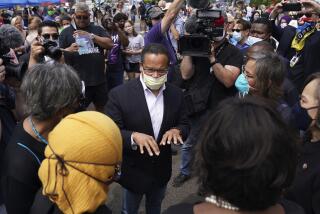Panel Urges Loosening of Labor Rules : Workplace: Bipartisan group’s recommendations on worker-management committees leaves both sides dissatisfied.
- Share via
WASHINGTON — Restrictions should be eased on companies’ worker-management committees, but such groups are no substitute for labor unions, a bipartisan labor-policy commission says.
Neither organized labor nor business was completely satisfied with the recommendations issued Monday by the Clinton Administration’s 10-member Commission on the Future of Worker-Management Relations.
The bipartisan commission, headed by John T. Dunlop, labor secretary under former President Gerald Ford, noted that in a preliminary report last May, it found a solid base of experience on which to build more cooperative and productive workplace relations--”innovative partnerships in collective bargaining and the array of employee involvement programs operating in many workplaces across the country.”
It said its final recommendations would give workers and managers “the tools and flexibility to do what they say they want to do and are capable of doing to improve workplace performance.”
The panel urged clarification of labor law to ensure employee participation programs are not unlawful simply because they involve discussion of work conditions or pay--”as long as such discussion is incidental to the broad purposes of these programs.”
“At the same time,” it added, “the commission reaffirms the basic principle that these programs are not a substitute for independent unions. The law should continue to make it illegal to set up or operate company-dominated forms of employee representation.”
The commission also recommended changes in labor law to encourage collective bargaining and protect workers’ rights to choose whether to be represented in the workplace.
Labor Secretary Robert B. Reich said he and Commerce Secretary Ronald H. Brown would review the recommendations and pass their analysis on to President Clinton. He also urged the Republican-led Congress to analyze the report and said he hoped there could be a “reasoned, thoughtful debate.”
The AFL-CIO contended the recommendations do not include sufficient protection for workers belonging to, or wanting to join, unions. And it criticized a proposal that would permit employers to decide the membership of worker-management committees.
Organized labor was supported in a dissent by Douglas A. Fraser, a commission member and former president of the United Auto Workers.
“I cannot join in any statement that proclaims that you can have fully effective worker-management cooperation programs without having a truly equal partnership based upon workers having an independent voice,” he said.
On the other hand, the Labor Policy Assn. representing human resource executives of 225 major corporations complained the commission focused on strengthening union organizing rather than “point the way towards increased employer-employee cooperation.”
More to Read
Inside the business of entertainment
The Wide Shot brings you news, analysis and insights on everything from streaming wars to production — and what it all means for the future.
You may occasionally receive promotional content from the Los Angeles Times.










